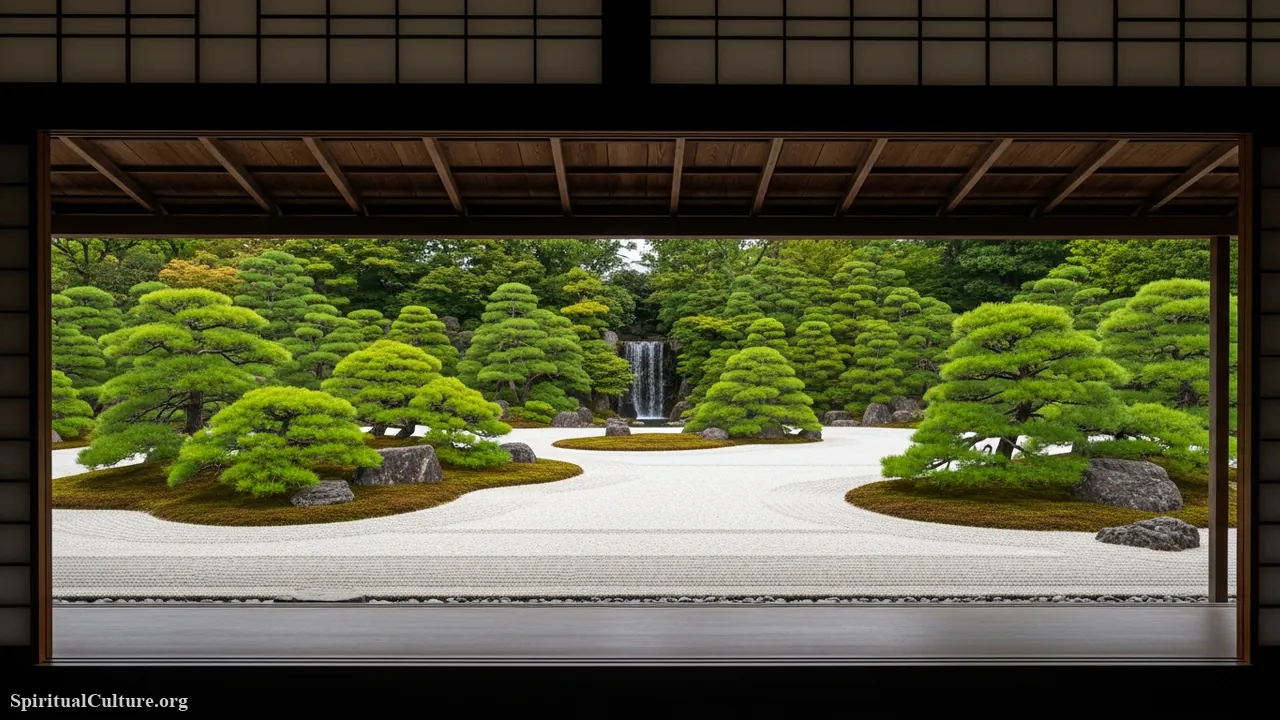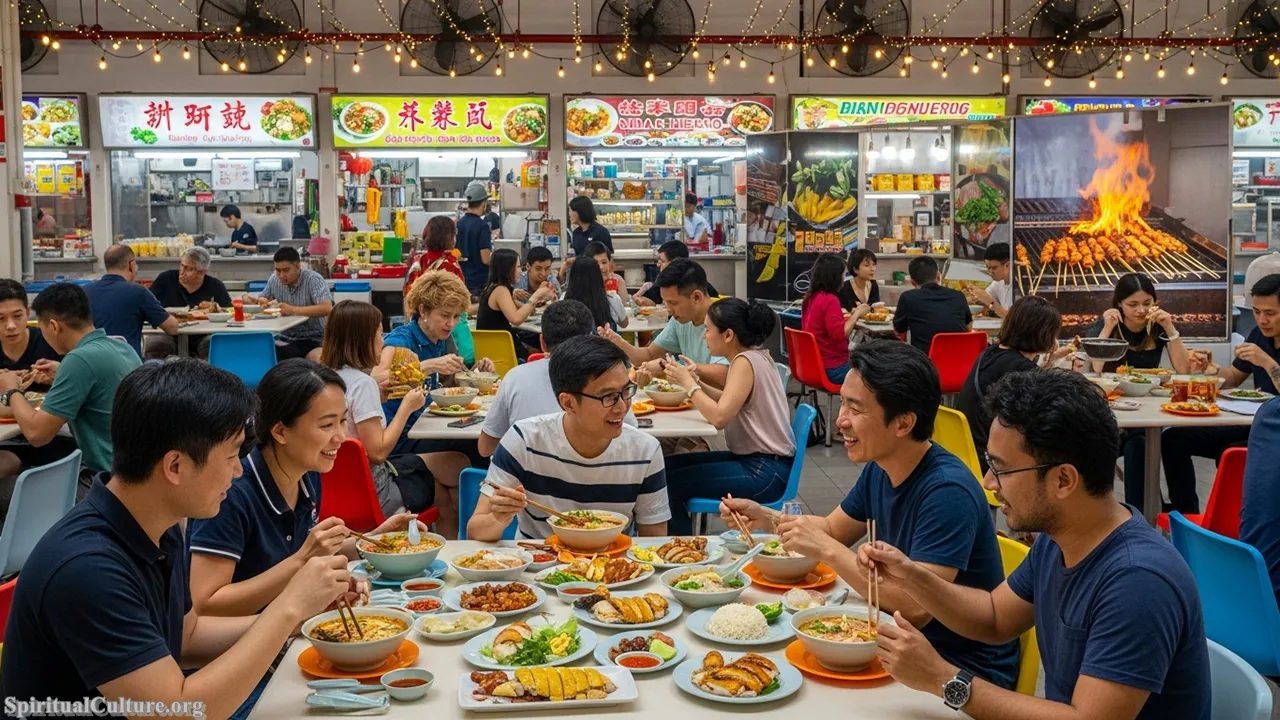Qatar, a nation that has rapidly embraced modernity, maintains an intensely rich tapestry of heritage profoundly rooted in Islamic values and the resilient spirit of its Bedouin and maritime past. At Spiritual Culture, we believe the true measure of a nation’s greatness lies not just in its infrastructure but in the integrity of its traditions.
This authoritative list, meticulously researched as of the Current Time of Writing (November 2025), goes beyond mere customs to identify the ten cultural practices that hold the deepest spiritual significance and continue to shape the Qatari identity. From communal prayer to ancient maritime rituals, these traditions are the living vessels of the nation’s soul.
Our ranking criteria prioritizes the tradition’s depth of spiritual impact, its unifying role in society, and its official recognition as safeguarded heritage (including UNESCO status). By understanding these core elements, we gain a profound appreciation for Qatar’s unique synthesis of Islamic faith, tribal loyalty, and world-class hospitality.
Table of the Top 10 Cultural Traditions in Qatar and Their Spiritual Impact
| Rank | Cultural Tradition | Spiritual Significance | Heritage Status/Context |
|---|---|---|---|
| 1 | The Five Daily Prayers (Salah) | Fundamental pillar of Islam; central devotion and spiritual discipline. | Core practice of the State religion (Sunni Islam). |
| 2 | Ramadan & Eid Celebrations | Time of self-purification, devotion, communal charity (Zakat), and forgiveness. | Major annual religious observation and national festival. |
| 3 | Al-Majlis Gathering & Hospitality | Symbol of generosity, community unity, respect for elders, and oral heritage. | UNESCO Intangible Cultural Heritage of Humanity (Multi-national inscription). |
| 4 | Serving Arabic Coffee (Gahwa) & Dates | Ritualized act of welcome, honor, and generosity; refusal is considered impolite. | UNESCO Intangible Cultural Heritage (Gahwa & Date Palm Heritage). |
| 5 | Traditional Qatari Dress (Thobe & Abaya) | Embodiment of Islamic values of modesty, respect, and cultural identity. | Daily cultural adherence and national symbol of pride. |
| 6 | Falconry (Al Qanas) | Historical Bedouin skill representing patience, courage, and man’s connection to nature. | UNESCO Intangible Cultural Heritage of Humanity (Multi-national inscription). |
| 7 | Qatar National Day (December 18) | Celebration of national unity and the foundation of the modern state in 1878. | Key secular holiday, fostering collective identity and pride. |
| 8 | Dhow Boat Building & Maritime Heritage | Connection to the sea-faring and pearl diving past, symbolizing resilience and livelihood. | Celebrated at the annual Traditional Dhow Festival (e.g., Katara). |
| 9 | The Use of Oud and Bukhoor | Aromatic ritual for purification, honoring guests, and enhancing spiritual atmosphere. | Daily cultural ritual and key feature of Qatari hospitality. |
| 10 | Garangao Festival | Mid-Ramadan children’s festival, promoting family ties, giving, and joy within the faith. | Unique Qatari/Gulf social practice, sustaining cultural transmission. |
Top 10. Garangao Festival
Celebrated on the 14th night of Ramadan, the Garangao festival is a vibrant and unique Qatari tradition focused entirely on children. After breaking the fast, youngsters dress in traditional attire and wander through their neighborhoods, singing traditional songs and collecting bags of sweets and nuts from their neighbors. It serves as a spiritual milestone, a joyous reward for successfully completing the first half of the holy month’s fast, instilling the value of community early on.
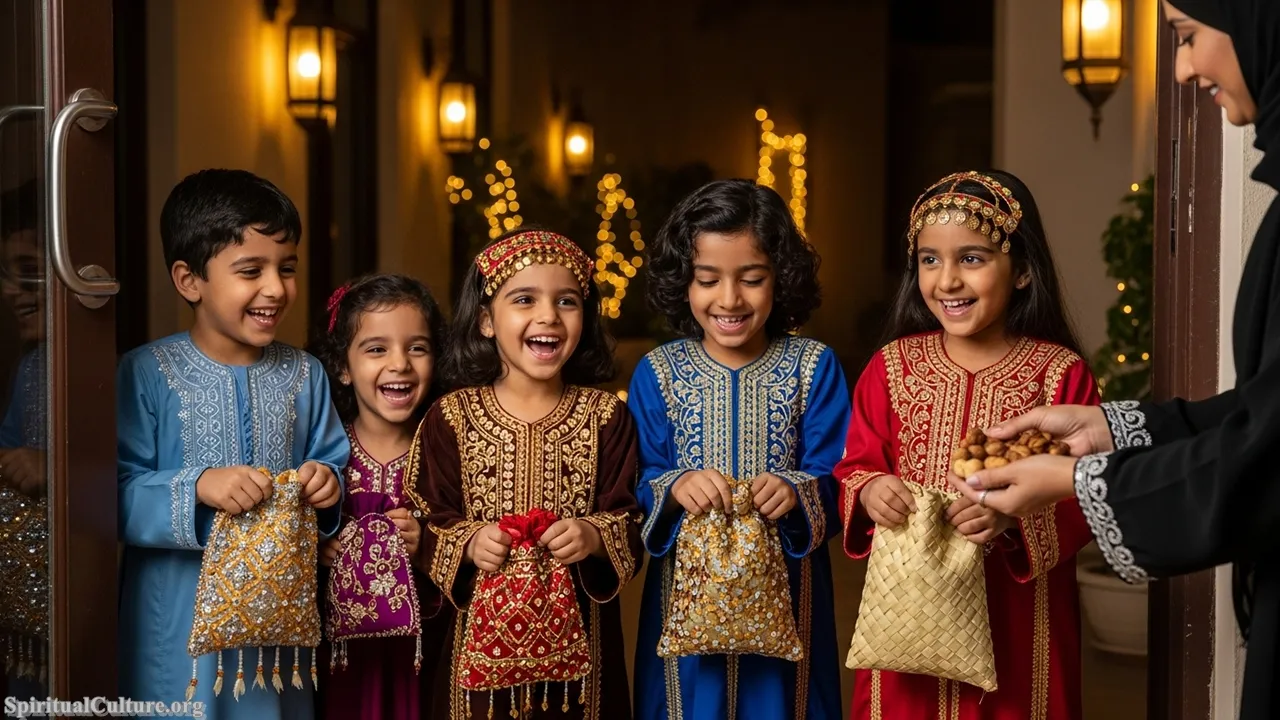
This tradition is a powerful tool for cultural transmission, reinforcing key Islamic and Qatari values in a playful, memorable way. The spiritual impact is subtle but significant: it fosters a sense of communal belonging, celebrates childhood innocence, and normalizes the concept of charitable giving. By encouraging neighbors to give generously, it extends the spirit of Ramadan’s charity—Zakat—into a daily, personal interaction among the community.
The continuation of Garangao demonstrates Qatar’s commitment to nurturing its familial and social bonds. It is a moment of collective happiness, serving as a reminder that devotion and spiritual discipline are not solely about solemnity, but also about the joy of sharing and the celebration of family life. Preserving this practice ensures the next generation embraces their heritage with enthusiasm.
Cultural/Spiritual Highlights
- Occurs exactly on the 14th night of the Holy Month of Ramadan.
- Promotes community bonding and charitable giving among neighbors.
- Children wear specific traditional Qatari attire for the collection.
- A cherished practice distinct to the Gulf region.
Top 9. The Use of Oud and Bukhoor
The captivating scent of oud (agarwood) and bukhoor (scented wood chips burned as incense) is an ever-present feature of Qatari social life, from private homes to official majlis gatherings. More than just a fragrance, this aromatic ritual is a profound cultural marker of purity, respect, and deep-seated hospitality. Guests are often offered the smoke of bukhoor as a final gesture before departure, symbolizing a blessed farewell.
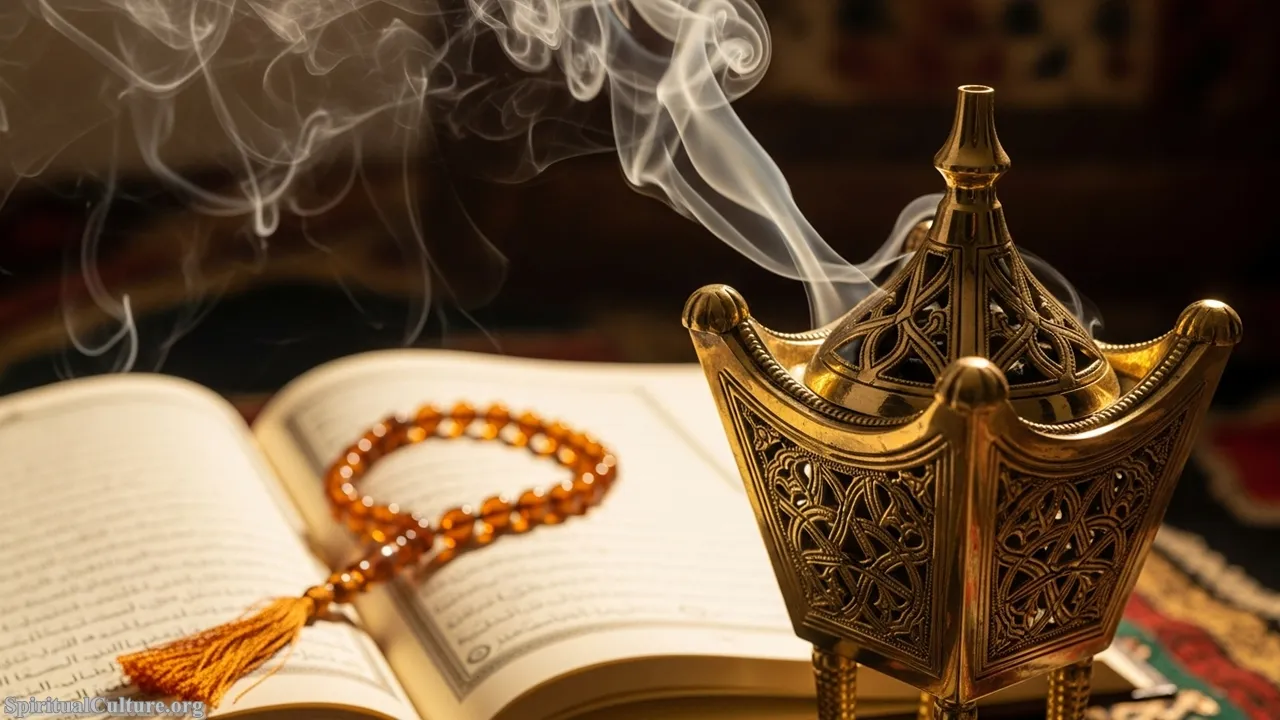
The spiritual impact of oud and bukhoor is tied to the concept of sanctification and honoring sacred spaces and guests. In Islamic tradition, cleanliness and a pleasant aroma are highly valued, often used before prayer or on holy days like Friday (Jumu’ah). Burning the incense is a deeply ingrained cultural practice that transforms a physical space into a more spiritually welcoming environment, showing the guest that they are worthy of the home’s finest offering.
The persistence of this tradition highlights the Qatari culture’s emphasis on sensory reverence and refined social etiquette. It is a silent, elegant communication of respect and goodwill. Learning to appreciate the subtle differences in bukhoor blends is to engage directly with the sophisticated humanistic side of Qatari heritage, recognizing that true wealth is expressed in generosity and the shared experience of beauty.
Cultural/Spiritual Highlights
- The ritual is deeply rooted in ancient Arab traditions of purification.
- Used in mosques, homes, and particularly on holy days (Fridays and Eid).
- Offering bukhoor to guests is a high honor, signifying profound hospitality.
Top 8. Dhow Boat Building & Maritime Heritage
Qatar’s identity is inextricably linked to the sea, where traditional wooden dhow boats once served as the primary vessels for pearl diving and trade. The skills and craftsmanship involved in building and navigating these boats represent a profound historical and cultural connection to the elements. While the oil industry transformed the economy, the dhow remains a powerful symbol of resilience, adventure, and the practical wisdom of the ancestors who harnessed the sea.
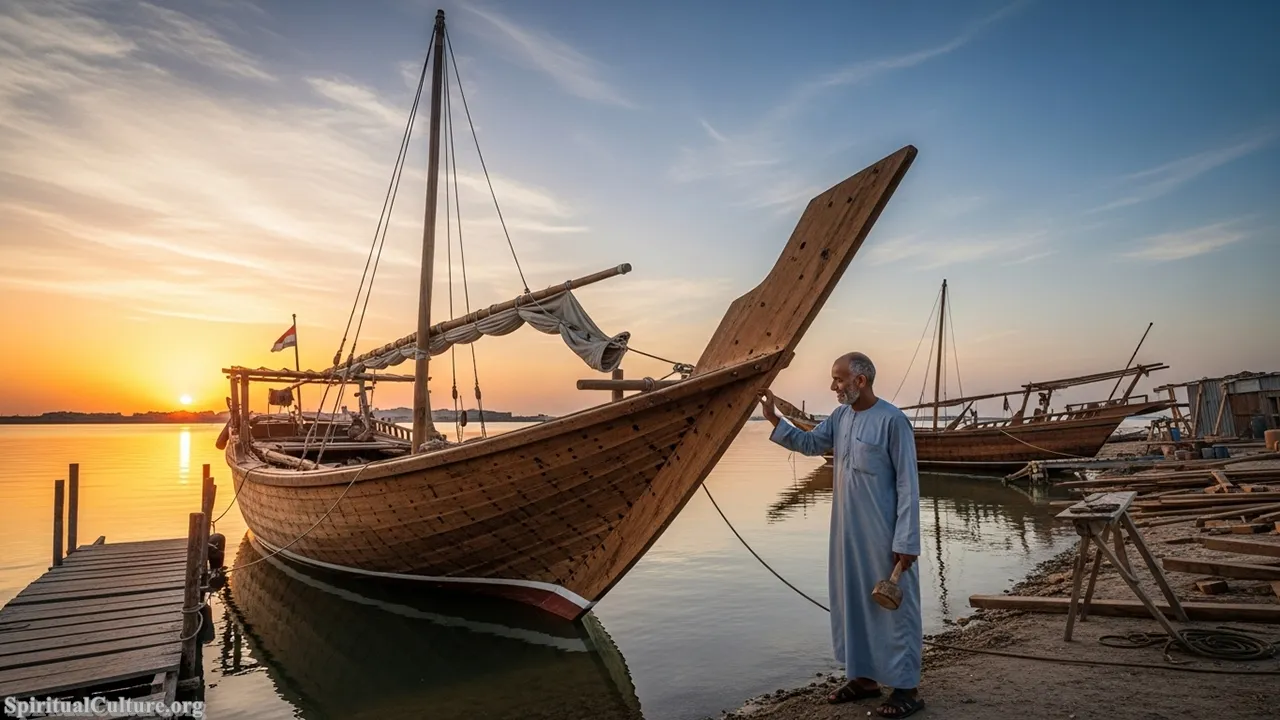
The spiritual weight of this maritime tradition stems from the difficult and often perilous life of the pearl divers. Their existence fostered a profound reliance on faith (tawakkul) and the collective unity of the crew. Each voyage was a spiritual journey where the men’s livelihood—and life itself—was entrusted to God and the wisdom passed down through generations. Today, the annual Traditional Dhow Festival celebrates this spiritual bond with the Gulf.
Protecting the maritime heritage, symbolized by the beautiful dhows visible in the Doha skyline, is crucial for maintaining the nation’s historical memory. It teaches the vital lesson of resourcefulness and interdependence. The dhow stands as a silent monument to the strength of the Qatari people who survived and built their culture not from the desert, but from the hard-won bounty of the ocean.
Cultural/Spiritual Highlights
- Dhows were the main vessels for the historic pearl-diving industry.
- The craft is celebrated at the annual Traditional Dhow Festival in Katara.
- Symbolizes the resilience, collective spirit, and reliance on God by the sea-faring ancestors.
Top 7. Qatar National Day (December 18)
Qatar National Day, known locally as Al Yawm Al Watani, marks the date in 1878 when Sheikh Jassim bin Mohammed Al Thani succeeded his father and unified the local tribes, laying the groundwork for the modern state. Far more than a simple patriotic holiday, the day is a comprehensive cultural celebration where citizens proudly showcase their national heritage, history, and the values that underpin their collective identity.
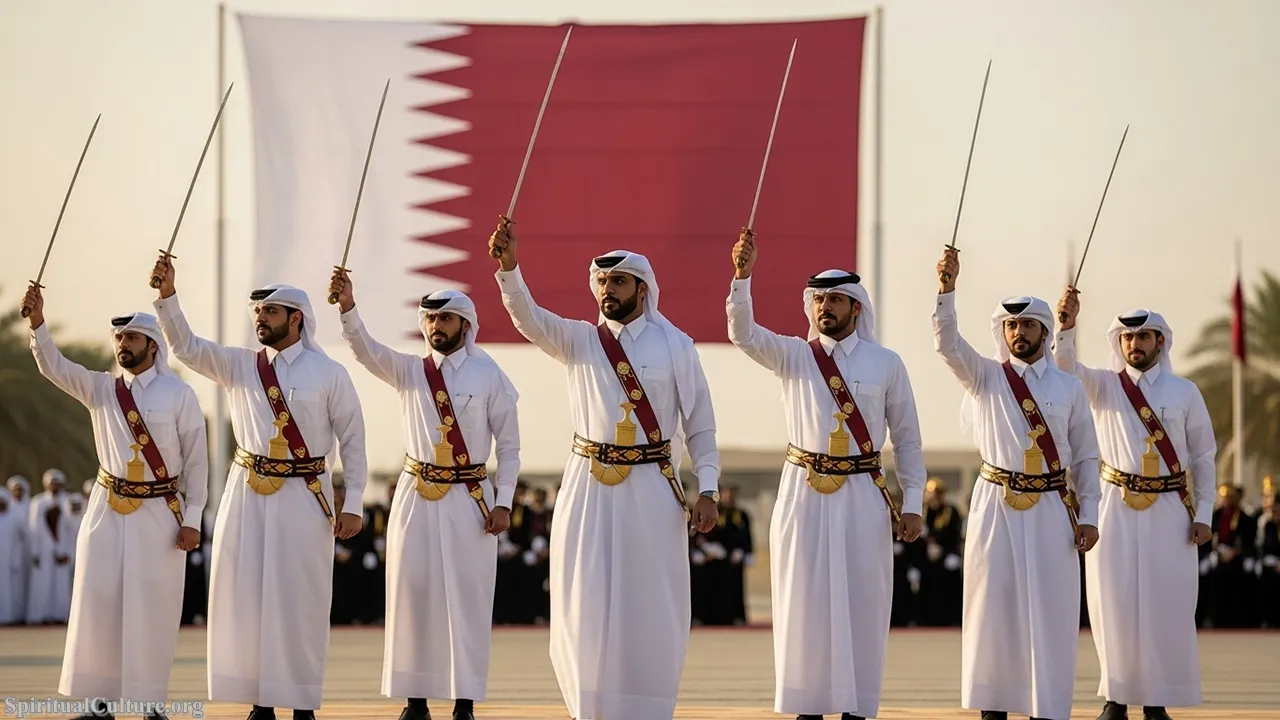
The spiritual impact of National Day lies in its ability to unify the community under a single, shared narrative of perseverance and identity. It is a collective moment of gratitude for the nation’s security, prosperity, and the harmonious integration of faith and state. The day’s emphasis on national pride is inextricably linked to the religious principles of loyalty, community responsibility, and reverence for leadership, all central tenets of Qatari Islamic society.
The observance of Qatar National Day serves as a vital yearly affirmation of the nation’s journey from a collection of tribes to a unified, forward-looking global state. It underscores a moral lesson about the power of vision and unity. When citizens don their national dress, recite poetry, and gather in public spaces, they are actively participating in the living history of their country, ensuring its values are vigorously transmitted.
Cultural/Spiritual Highlights
- Commemorates the 1878 unification of the Qatari tribes.
- Fosters a sense of unity, loyalty, and collective gratitude for the nation’s progress.
- Features the traditional Ardha (sword dance), showcasing martial heritage.
Top 6. Falconry (Al Qanas)
Falconry is an ancient Bedouin practice that transcends its status as a sport; it is an intimate partnership between man and bird, honed over millennia in the Arabian Peninsula. Falcons are revered in Qatar as symbols of strength, patience, and honor. The tradition involves deep knowledge of nature, conservation, and complex training methods, ensuring it remains an authentic link to the nomadic way of life.

The spiritual depth of falconry lies in the development of personal character and the application of Islamic principles to the natural world. The patience required for training a falcon is a form of spiritual discipline (sabr), while the connection to the desert environment reinforces the belief in stewardship of God’s creation. It teaches that the greatest reward comes from mutual trust and respect, lessons directly transferable to human relationships and societal conduct.
As a UNESCO-inscribed intangible heritage, falconry is internationally recognized for its cultural value. For Spiritual Culture, it represents the noble side of human interaction with nature—a reflective engagement with the wild that develops virtues essential for community leadership. Preserving Al Qanas is to preserve the Bedouin soul of Qatar, ensuring the values of courage and precision endure.
Cultural/Spiritual Highlights
- UNESCO Intangible Cultural Heritage of Humanity (Multi-national inscription).
- The practice embodies Bedouin values of patience, courage, and self-reliance.
- Falcons are symbols of nobility and status in Qatari society.
Top 5. Traditional Qatari Dress (Thobe & Abaya)
The traditional attire—the white thobe and ghutra (headdress) for men, and the black abaya and shaila (headscarf) for women—is a daily, visible cultural tradition. Far from mere clothing, the national dress is a deliberate and elegant expression of cultural adherence and faith. It provides practical protection from the climate while projecting dignity and a commitment to modesty, which are foundational Islamic values.

The spiritual significance is inherent in the principle of modesty (hayā’), a core value in Islam that promotes inner purity and outer decorum. Wearing the traditional dress is a quiet, powerful statement of belonging and respect for community norms. It eliminates social distinctions often found in Western fashion, unifying Qataris under a common visual identity that privileges character over display. For both men and women, it is a constant, tangible link to the customs of their ancestors.
The maintenance and proud display of the national dress in modern, cosmopolitan Doha highlights the culture’s unwavering self-confidence. This tradition serves as a constant moral anchor, demonstrating that a nation can embrace globalization without sacrificing the sacred values and humanistic ethics embedded in its heritage. It is a daily practice of cultural preservation.
Cultural/Spiritual Highlights
- Embodies the core Islamic principle of modesty (hayā’).
- Provides a unified cultural identity for both men (Thobe) and women (Abaya).
- The dress is a daily, conscious act of fidelity to national and religious values.
Top 4. Serving Arabic Coffee (Gahwa) & Dates
The ceremonial serving of Gahwa (Arabic coffee, often spiced with cardamom) and fresh dates is the cornerstone of Qatari hospitality. This tradition is a delicate ritual governed by meticulous etiquette: serving begins with the eldest and only the right hand must be used. Refusing this offering is considered a slight, while gently shaking the empty cup signifies a guest is finished. The practice is so revered that the Date Palm Heritage and Arabic Coffee are inscribed on UNESCO’s intangible heritage lists (multi-national nominations).
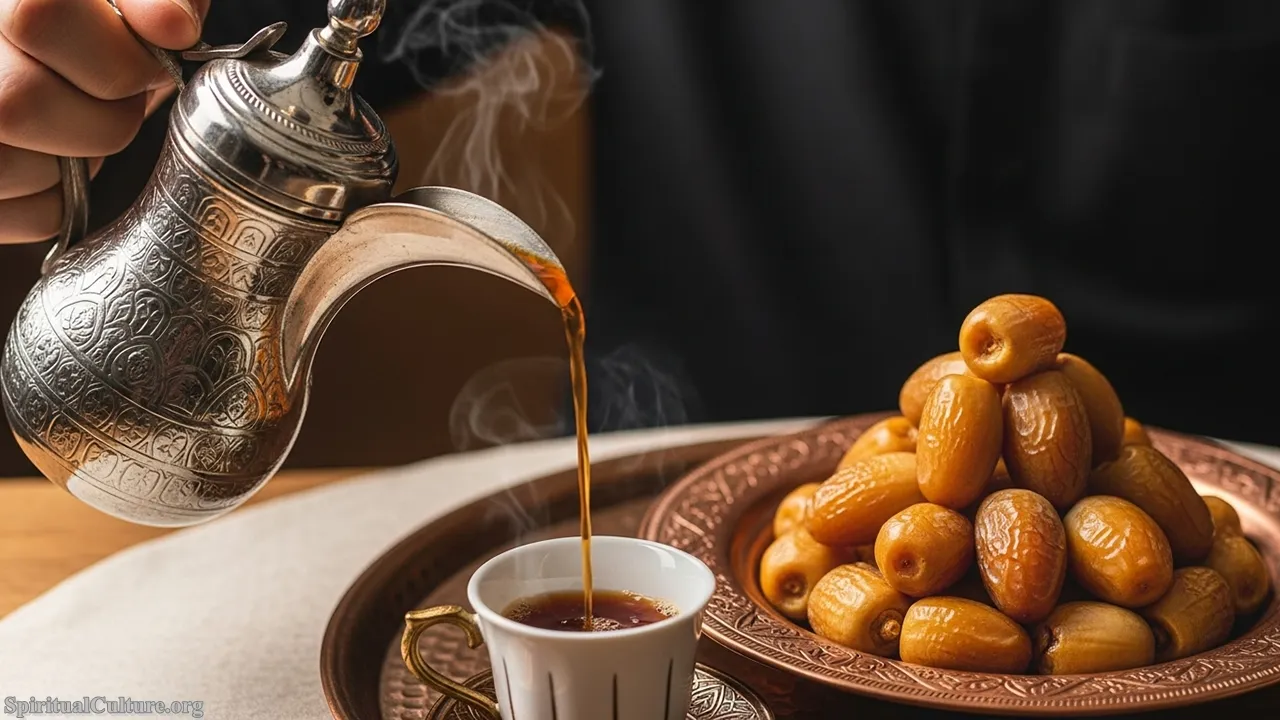
The spiritual power of this custom lies in its embodiment of the Islamic virtue of generosity (karam) and the honoring of the guest. The act of sharing Gahwa is an affirmation of peace, trust, and communal solidarity. The date, often the first thing eaten when breaking fast during Ramadan, holds spiritual significance as the fruit of the palm, an ancient source of life, symbolizing provision and blessing.
This enduring tradition demonstrates the beautiful humanism at the heart of Qatari society. It is a non-verbal covenant between host and guest that transcends language, focusing entirely on mutual respect and welcome. The profound moral lesson is that true connection is forged through simple, sincere acts of sharing, solidifying this practice as one of Qatar’s most vital living arts.
Cultural/Spiritual Highlights
- UNESCO Intangible Cultural Heritage (Date Palm Heritage & Arabic Coffee).
- Governed by strict etiquette (use of the right hand, serving the eldest first).
- The ritual symbolizes karam (generosity) and peace between individuals.
Top 3. Al-Majlis Gathering & Hospitality
The Majlis, meaning ‘a place of sitting,’ is the central communal space in a Qatari home and society, recognized by UNESCO for its cultural significance. It is a traditional reception area where guests are received, social issues are discussed, poems are recited, and elders share wisdom. The Majlis is where the social fabric of the family and tribe is continually woven, upholding the values of consultation and community.
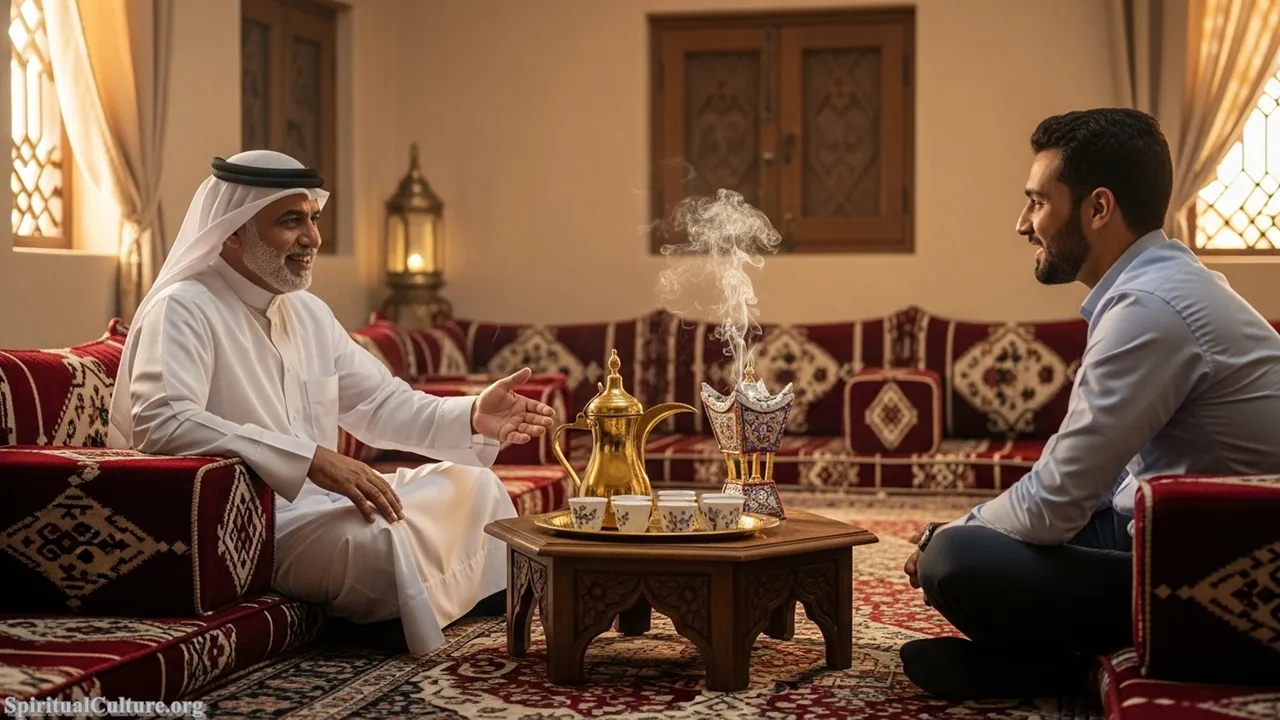
The spiritual impact is immense, as the Majlis institutionalizes the virtues of open-hearted hospitality, respect for age, and democratic discussion (Shura). It is a setting where social equity is enacted: all are welcomed, and their opinions are heard. This tradition reflects the Islamic emphasis on the strength of the community (Ummah) and the moral obligation to honor visitors and maintain kinship ties.
Preserving the spirit of the Majlis is vital for the future of Qatari identity, ensuring that modernization does not erode the foundational value of human interaction and dialogue. The tradition carries a timeless moral lesson: that true societal strength comes from active listening and collective wisdom. It remains the beating heart of social life, where history, heritage, and the future converge.
Cultural/Spiritual Highlights
- UNESCO Intangible Cultural Heritage of Humanity (Multi-national inscription).
- Serves as the central space for social, tribal, and community consultation (Shura).
- Instills profound respect for elders and the oral transmission of heritage.
Top 2. Ramadan & Eid Celebrations
Ramadan, the ninth month of the Islamic lunar calendar, and the subsequent festivals of Eid Al-Fitr and Eid Al-Adha, are the most impactful annual cycle of traditions in Qatar. The entire society shifts to accommodate the spiritual discipline of fasting from dawn until sunset. This period is dedicated to intense reflection, prayer, increased charitable giving (Zakat), and communal gathering for Iftar (the fast-breaking evening meal).
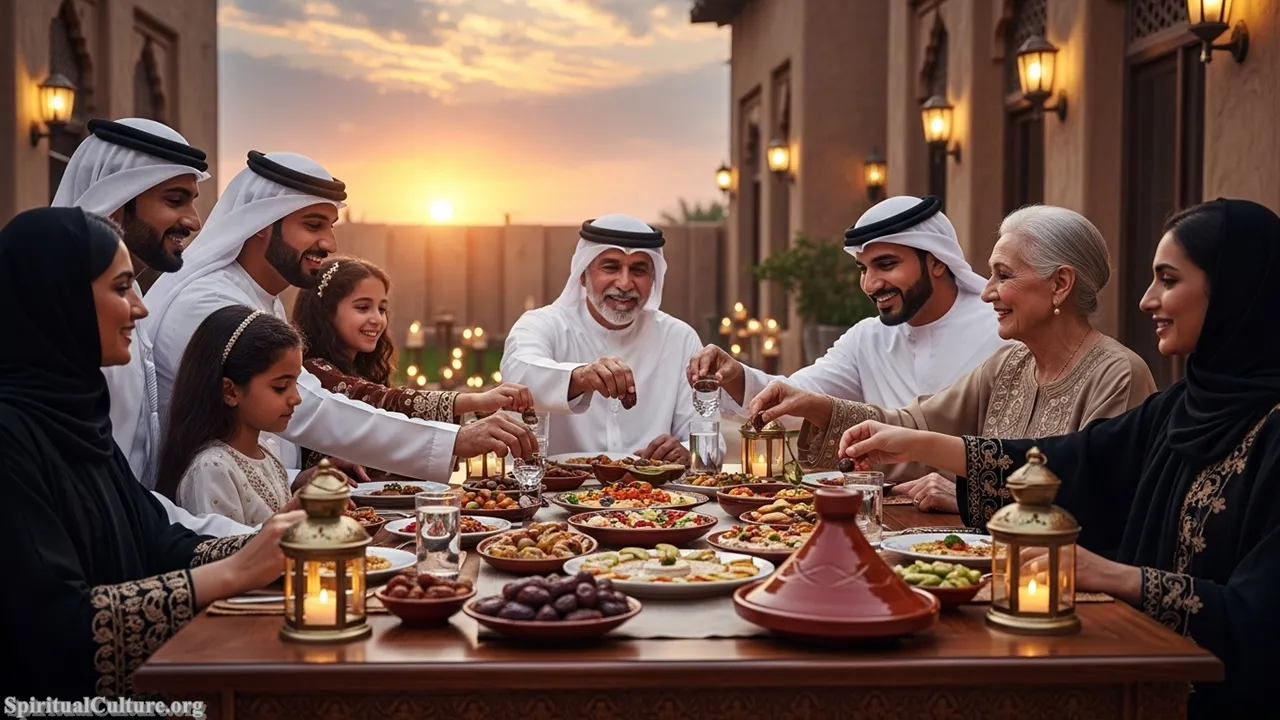
The spiritual significance is paramount, as Ramadan is one of the Five Pillars of Islam. The discipline of fasting fosters immense empathy for the poor and cultivates self-control, leading to profound spiritual purification and a closer connection to God. The Eid celebrations that follow—marked by communal prayer, feasting, and the exchange of gifts—reaffirm family ties and the obligation to share one’s fortune with the less privileged, embodying the highest form of humanistic charity.
This tradition provides the primary rhythm of the Qatari year, unifying citizens and residents in a shared commitment to morality and spiritual growth. The deep cultural and spiritual importance ensures that despite the nation’s rapid development, its moral compass remains firmly rooted in faith. The lesson is one of humility, perseverance, and the collective celebration of a purified spirit.
Cultural/Spiritual Highlights
- Ramadan is one of the Five Pillars of Islam, centering life on devotion.
- Requires self-control, fosters empathy, and encourages mandatory charity (Zakat).
- Eid Al-Fitr and Eid Al-Adha are major national holidays focused on family and faith.
Top 1. The Five Daily Prayers (Salah)
The practice of Salah, or the five daily ritual prayers, is undeniably the most important cultural and spiritual tradition in Qatar. As a foundational Pillar of Islam and the state religion, its observance dictates the daily rhythm of life, with the call to prayer (Adhan) echoing across the country five times a day. It is a constant, physical reminder of the individual’s direct relationship with God, transcending all societal distinctions.
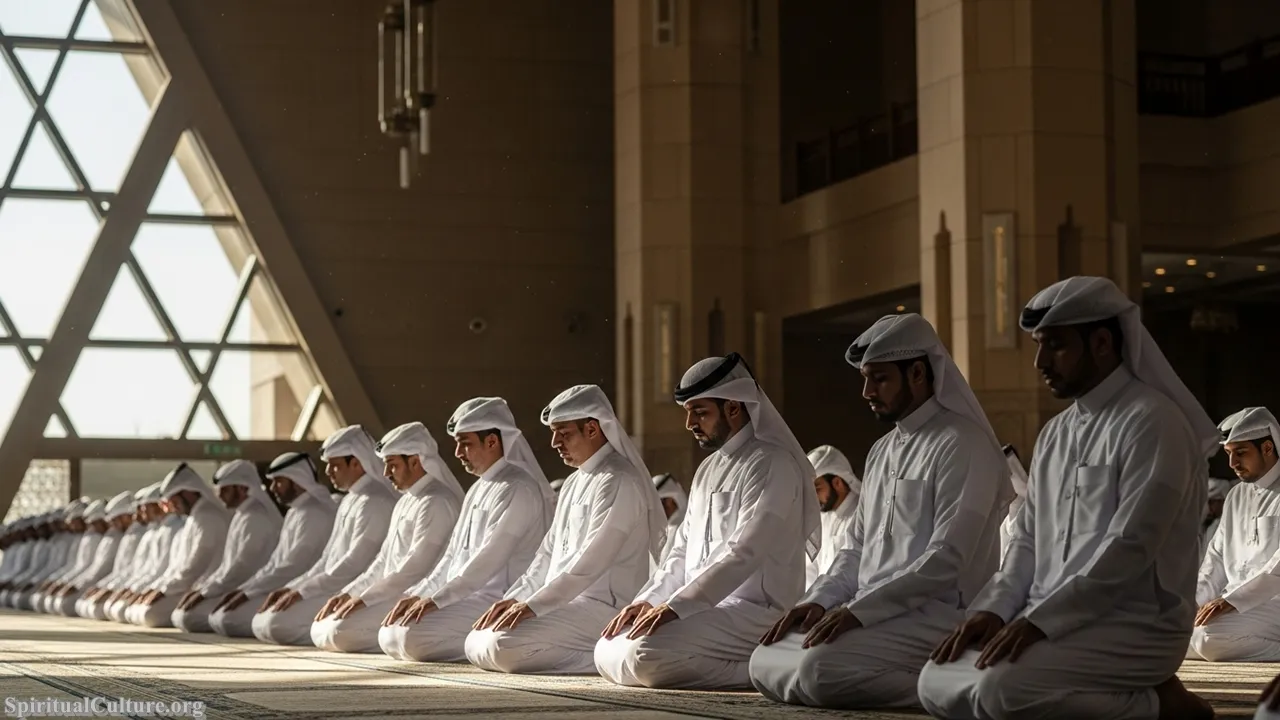
The profound spiritual impact lies in its role as a mandatory, recurring, and structured act of submission (Islam). It enforces spiritual discipline, humility, and mindful detachment from worldly pursuits for a few moments each day. The communal aspect, particularly the Friday congregational prayer (Jumu’ah), reinforces the collective identity of the Ummah (the global Muslim community), creating a powerful, unifying cultural bond that is constant and non-negotiable.
As the cornerstone of the nation’s cultural-spiritual framework, Salah sets the moral and ethical tone for all other traditions. It is the living, breathing heart of Qatari culture, a timeless act of devotion that anchors the nation amidst rapid global change. This tradition is the ultimate humanistic practice, teaching that regardless of status, all stand equal before the Creator, a lesson of profound societal significance.
Cultural/Spiritual Highlights
- The second and most fundamental Pillar of the Islamic faith.
- The call to prayer (Adhan) dictates the daily rhythm of life across Qatar.
- Reinforces the spiritual discipline, humility, and equality of all adherents.
- The Friday prayer (Jumu’ah) is a significant weekly communal event.
A Heritage of Resilience and Faith
The traditions of Qatar are not museum pieces; they are the vibrant, dynamic forces that define its people in the 21st century. The nation’s journey, from the pearl diving of Al Zubarah to the skylines of Doha, has been guided by a steadfast adherence to the principles of Islam, the code of Bedouin honor, and the unwavering spirit of hospitality. At Spiritual Culture, we celebrate this enduring legacy, finding in these traditions a profound testament to the power of faith to unify, sustain, and inspire.
From the foundational sanctity of the Five Daily Prayers to the open-door policy of the Majlis, Qatar presents a model of cultural strength derived from conviction. These traditions serve as a vital moral compass, proving that a country can lead in innovation while remaining deeply rooted in its ancestral values. May the spiritual light of these ten traditions continue to shine brightly, offering inspiration to the global community.

